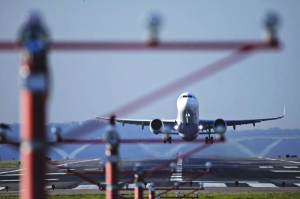Global obligation to keep aviation out of harm’s way in conflict zones


A passenger aircraft takes off from an airport in Virginia. In the wake of the Middle East crisis and ongoing war between Russia and Ukraine, the International Air Transport Association, recently reminded governments around the world of the importance of protecting civil aviation, including airport and air navigation infrastructure, during times of conflict.
Protecting civil aviation safeguards innocent lives and prevents tragic losses.
The aviation industry is a significant contributor to the global economy. Disruption to air travel will have severe economic repercussions, affecting trade, tourism, and employment. Airports, airlines, and related businesses suffer, impacting communities that rely on aviation for their livelihoods.
In the wake of the Middle East crisis and ongoing war between Russia and Ukraine, the International Air Transport Association (IATA), recently reminded governments around the world of the importance of protecting civil aviation, including airport and air navigation infrastructure, during times of conflict.
Civil aviation fulfils a purpose that transcends politics to ‘create and preserve friendship and understanding among the nations and peoples of the world’.
The Chicago Convention, signed some 80 years ago as the Second World War raged, begins with those words.
They are a timeless reminder of civil aviation’s essential and unique role in connecting people and delivering goods over vast distances. In the turbulent world of 2024, the truth of the Chicago Convention’s preamble rings loudly.
“We all want to live in a world at peace. Sadly, today, that is far from reality for many people. That is why it is necessary to remind all involved in conflict of the need to ensure that flights are safe, and that critical airport and air navigation infrastructure is not targeted in any hostilities,” according to IATA.
Civil aviation does not take sides in political conflicts. As an industry that requires the effective implementation of global standards to operate, aviation upholds global standards and the international rules-based order on which they rely.
“As the name implies, civil aviation serves the civilian population. It must be kept out of harm’s way by all actors in a conflict. This is our firm belief,” IATA noted.
More importantly, it is the unquestionable obligation of governments under international law.
International conventions, such as the Chicago Convention on International Civil Aviation, emphasise the importance of protecting civil aviation and maintaining safe airspace. Violating these norms during conflicts undermines global stability and lead to legal and diplomatic consequences.
During conflicts, managing airspace becomes all the more challenging, with increased military activities and potential threats to commercial aircraft. Protecting civil aviation requires coordinated efforts to ensure safe flight routes, timely information sharing, and compliance with international regulations.
According to Willie Walsh, Director General, IATA, the Chicago Convention explicitly obliges states to protect civil aircraft and passengers in flight, refrain from the use of force against civil aircraft, and by corollary coordinate and communicate any activities potentially hazardous to civil aviation. These are essential to keep flying safe.
“As the world works towards more peaceful days, aviation will support the effort by connecting people and goods. In the meantime, combatants must know and abide by the rules of conflict and humanitarian assistance as laid out in international law. To simplify: do no harm to civilian aircraft, airports or air navigation services. This is non-negotiable and must be respected, even at the height of hostility,” Walsh noted.
Aviation connects people, nations, and economies. Disrupting civil aviation during conflict isolate regions, hinder evacuations, and cut off essential services.
Even in conflict zones, civil aviation often plays a vital role in transporting humanitarian aid, medical supplies, and personnel. Therefore, disruption to air travel hamper these efforts, exacerbating the humanitarian crisis. Protecting civil aviation helps ensure that life-saving assistance reaches those in need.
Maintaining civil aviation helps keep lines of communication and transport open, even in difficult circumstances.
Ensuring the safety of civil aviation during conflicts is not only a legal obligation but a moral imperative to protect lives, uphold international norms, and maintain the functioning of global society.

